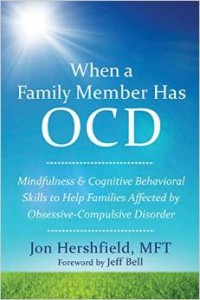 Jon Hershfield, MFT is a psychotherapist in private practice who specializes in the treatment of obsessive compulsive disorder (OCD). His most recent book, When a Family Member Has OCD, foreword by Jeff Bell, will be available on December 1st, 2015 here. Here is an article he wrote for us:
Jon Hershfield, MFT is a psychotherapist in private practice who specializes in the treatment of obsessive compulsive disorder (OCD). His most recent book, When a Family Member Has OCD, foreword by Jeff Bell, will be available on December 1st, 2015 here. Here is an article he wrote for us:
To Be a Truly Significant Other to an OCD Sufferer
It’s not unusual at some point in individual treatment for me to have my OCD client bring in a family member or significant other. Though OCD can make you feel alone in the universe, consistently surprised that most people don’t seem to think the way you do, the struggle doesn’t exist in a vacuum. Decisions people make in how they respond to unwanted thoughts cause ripple effects to throughout the family system. In other words, what you do, may affect what I do to someone else, who in turn may behave differently toward another and so on.
The first thing I ask the significant other in the session is, why is this person in therapy, do you think? What are they doing, what are you seeing, that is leading to the rational conclusion that this person needs help in the first place? The answers range from the obvious (she washes her hands all the time) to the heartbreaking (he won’t stop bothering me with confessions I don’t want to hear!). But the most common thing I hear from family members is something like, She’s in her head all day and I can just tell some thing is wrong. Family members of OCD sufferers often find themselves juggling a series of chainsaw-like considerations. If I’ve given him all he wants, why does he keep asking for more? If I stop giving him what he wants, how can I cope with his desperation? How can I reduce his suffering? Damned if you do, damned if you don’t. But this is due in large part to lacking insight and understanding into the mind of an OCD sufferer.
In my new book, When a Family Member Has OCD, I set out to achieve two objectives. First, I wanted there to be an empathy guide for family members of OCD sufferers. The biggest problem I find in OCD families is often the easiest address – they just don’t get it because no one’s ever really broken it down for them in a language that they speak. All of this psychological mumbo-jumbo (as it appears to them) can often just lead to the conclusion that the OCD sufferer is sick or broken. In fact, the OCD sufferer has a common, difficult, yet treatable mental heath challenge that simply distorts the way thoughts and feelings are looked at and then responded to. Second, once empathy in the family is maximized as best it can be, I wanted there to be some basic guidelines available for helping family members support each other without having to become each other’s therapist. To do this, I wrote a sort of roadmap to approaching the OCD sufferer, one that can encourage openness to being helped and interest in helping themselves in the family context. The four I’s discussed are:
Identify the compulsion, not the person, as the problem: Family members need to be able to differentiate between something a loved one is doing in response to unwanted thoughts and something a loved one is doing because they simply feel like it or it suits their personality. Conflict immediately arises when delays, requests for accommodation, or just confusing behavior gets attributed to one’s character instead of being understood within the context of OCD. If families can come together to support one another in navigating this disorder, it all hinges on this first step of seeing the disorder and the person as not being one and the same.
Invite collaboration: Building on the awareness that compulsions are the problem, not people, families can come together to strategically target the OCD at home. But this has to be done in the spirit of teamwork, not oppression. Getting family members and their loved ones with OCD on the same side against the disorder takes a special kind of effort. Approaching an OCD sufferer with a simple mandate to “get over it” or “get it together” does little to change the grip OCD has on the family. The key to inviting positive change is making a better offer than the OCD, not just another threat.
Interrupt the obsessive-compulsive cycle (with permission): Cognitive behavioral therapy (CBT), mindfulness, and exposure with response prevention (ERP) are effective interventions in the battle against OCD. Once an agreement to collaborate among family members has been achieved, more concrete interventions can be implemented. Accommodation of compulsions can be gradually reduced, as can reassurance-seeking/giving. Increasingly straightforward blocking strategies can be implemented to reduce physical compulsions (such as checking and washing). Contracts for how to deal with OCD-related behaviors can be drawn up and followed. All of this is possible when roles are made clear.
Integrate and model healthy behaviors: As compulsions are reduced and mastery over the disorder continues to develop, pockets of family life that had been filled with OCD symptoms will rather abruptly become empty. Families paying the right kind of attention to this can fill these voids with healthy behaviors, healthy communication, and healthy modeling for one another. This can be enhanced by family members without OCD challenging themselves to accept uncertainty, expose to fears, observe their own thoughts with less judgment, and basically get a taste of what their loved one is putting so much effort into.
None of these guidelines are meant to replace professional help. In fact, in most cases I suspect they will lead to the conclusion that the right kind of professional help is something feasible and worth pursuing. For this reason I included a section of When a Family Member Has OCD covering some of what to expect when seeking professional help. I also had the opportunity to include in the book a lot of do’s and don’ts that apply specifically to different family dynamics. Relating to a parent who has OCD and trying to understand a sibling with OCD are not the same. How it affects you, what’s expected of you, what you can do to help take care of yourself as well as your loved one – all of this is colored by the specific relationship dynamic.
OCD is a painful and frustrating disorder, but when a family can come together to overcome it, the journey often brings about an unparalleled trust among loved ones and with it, a brighter, happier family system.
 Now fast forward to the OCD Conference of 2015. I again attended his workshop on taboo thoughts but this time observed a peer share her story—now a witness to the vulnerable place I was in just a year prior. The audience again created a sense of community. The community who helped hold me accountable to my commitment to drive again; the community that Dr. Baer introduced me to. By asking for a volunteer that day, Dr. Baer helped me decide I wanted back in the driver’s seat.
Now fast forward to the OCD Conference of 2015. I again attended his workshop on taboo thoughts but this time observed a peer share her story—now a witness to the vulnerable place I was in just a year prior. The audience again created a sense of community. The community who helped hold me accountable to my commitment to drive again; the community that Dr. Baer introduced me to. By asking for a volunteer that day, Dr. Baer helped me decide I wanted back in the driver’s seat.

